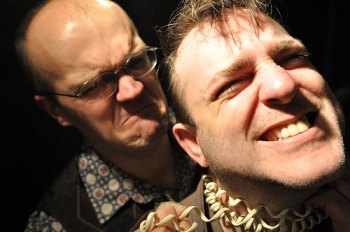There are more cleavages between the two estranged brothers in Sam Shepard’s 1980 hit than in a burlesque hall of mirrors. And Balagan’s stylized take makes sure you won’t miss them, casting two actors who could hardly seem less brotherly.
Taking an opposite tack from the 2000 Broadway production—which had similar-looking Philip Seymour Hoffman and John C. Reilly switch roles in alternating performances—Balagan gives us pale, lanky, balding Chris Bell as screenwriter Austin and husky, swarthy, full-haired Mike Dooly as drifter Lee. Not only would these two actors have a hard time swapping roles, it’s hard to imagine their two characters casually trading personas, as the script intends them to do.
Therein lies the problem, and the promise, of this interpretation. It’s both annoying and redundant in the first act to hear dialogue that already speaks plenty about the brothers’ polarities spoken by such extreme wild/tame caricatures. But the gamble does raise the stakes, not to mention the comic potential, as they begin to blend personas. The result is more conceptually interesting than theatrically effective, and provides some funny moments.
Austin, the responsible one, is house-sitting for his mother in suburban California and about to dig into a script assignment when his estranged, wayward brother Lee arrives for a surprise visit. Everything about Bell’s Austin conveys a guy who’s been neutered by civilization: Barely inhabiting his own body, he perches delicately at his typewriter on the orderly set, which is carpeted in Astroturf, presumably to further emphasize the safe artificiality of the suburban environment. Dooly’s Lee looms above him, impish teeth flashing, his interrogation style resembling a bear toying with a whippet in a room with no exit. Lee has just returned from months of living in the Mojave Desert, which connotes an unfettered state of mind that Austin increasingly aspires to. That’s especially true once movie producer Saul (played flatly, with sleazy pencil mustache, by co-director Shawn Belyea) agrees to develop one of Lee’s rambling stories at the expense of Austin’s precise and calculated one. But Saul wants Lee’s pulsing animal energy transmitted through Hollywood storytelling conventions, which Austin has mastered.
As the brothers gradually swap personas, the transition is “sold” through the darkened scene changes, in which the actors rock out to the Dead Kennedys’ “California Über Alles” and Patti Smith’s Horses while rearranging the set. The first few times, their movements seem like gentle, involuntary spasms, but as the psyche war builds, these interludes become more violent and frenetic, reflecting their emotional shakeups.
During their long night of quasi-collaboration, drunk Austin suits up in Lee’s tattered clothes while Lee flaunts preppy new golf shoes, compliments of Saul. Austin’s transformation feels contrived here, but to Dooly’s credit, Lee retains his animal core under the fancy footwear. He waxes dreamy-eyed about dogfighting. He cracks his vertebrae and responds visibly to a yen in his trunk for sex. Having to pursue the search for sex by phone is half of Shepard’s tragicomic vision of modern life. The other half is wanting to kill somebody with that phone’s cord.








